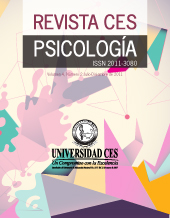Mead's Symbolic Interactionism and Karl Popper's Argument for Indeterminism
DOI:
https://doi.org/10.21615/cesp.5599Keywords:
determinism, indeterminism, interactionism, reflexivity, agency, symbolic interactionism, George Mead, Karl PopperAbstract
The article presents a journey through some discursive expressions of Determinism and Indeterminism, from Classical Greece to Modern Science, as a preamble to understand the place of George Mead's Symbolic Interactionism in Social Sciences, and then explore the relationship of this theoretical perspective and methodological with a proposal by Karl Pooper exposed in his posthumous text "An Argument for Indeterminism" and show the powerful possible articulations between both perspectives. From this review it can be concluded that Interactionism is situated as a dialectical solution between the postulates of Determinism and Indeterminism, where the perspective of an active human being is offered, who as an agent, builds his life in the interaction with other symbolic referents. The agent as an actor is situated on a plane where he becomes a product and producer of his life from language.
Downloads
References
Álvaro, J., & Garrido, A. (2013). Teoría sociológica y vínculos psicosociales, pp. 45-110. En Álvaro, J. Fundamentos sociales del comportamiento humano. Barcelona: UOC.
Arroyo, S. (2007). Astrología, psicología y los cuatro elementos. Buenos Aires: Kier.
Audi, R. (2004). Diccionario Akal de Filosofía. Madrid: Akal.
Avila, R. (2008). Aproximación al concepto de determinismo. Cuestiones de Filosofía (10), 120-134. https://doi.org/10.19053/01235095.646
Belli, S., Aceros, J., & Harré, R. (2015). “It’s All Discursive!” Crossing Boundaries and Crossing Words with Rom Harré. Universitas Psychologica 14(2), 755-768. https://doi.org/10.11144/Javeriana.upsy14-2.iadc
Berger, P., & Luckmann, T. (2001). La Construcción Social de la Realidad. Buenos Aires: Amorrortu Editores.
Beuchot, M. (2011). Sobre el sentido de la vida, desde una hermenéutica analógica. Notandum (25), 1-8. http://www.hottopos.com/notand25/09-16Beuchot.pdf
Blumer, H. (1982). El Interaccionismo Simbólico. Perspectiva y método. Barcelona: Hora S.A.
Borges, J. L. (1998). Ficciones. Madrid: De Bolsillo.
Borges, J. L. (2001). El Aleph. Madrid: De Bolsillo.
Borges, J. L. (2014). Nueve ensayos dantescos. Akhenaton. Epub. http://assets.espapdf.com/b/Jorge%20Luis%20Borges/Nueve%20ensayos%20dantescos%20(8319)/Nueve%20ensayos%20dantescos%20-%20Jorge%20Luis%20Borges.pdf
Castoriadis, C. (1993). El inconsciente y la ciencia. Buenos Aires: Amorrortu.
Defoe, D. (2017). Aventuras de Robinson Crusoe. Buenos Aires: Biblioteca Virtual Universal.
Fernández, C. (2003). Psicologías Sociales en el Umbral del Siglo XXI. Madrid: Fundamentos.
Garrido, A., & Alvaro, J. (2007). Psicología Social. Perspectivas Psicológicas y Sociológicas. Madrid: McGraw-Hill/Interamericana de España.
González, W., & Alcodea, J. (2006). Contemporary Perspectives in Philosophy and Methodology of Science. Netbiblo.
Grunín, J. (2008). Procesos de simbolización y trabajos de historización en la adolescencia. Cadernos de Psicopedagogia 7(12), 1-16. http://pepsic.bvsalud.org/scielo.php?script=sci_arttext&pid=S1676-10492008000100004
Guamán, K., Hernández, E., & Lloay, S. (2020). El positivismo y el positivismo jurídico. Revista Universidad y Sociedad 12(4), 265-269. https://rus.ucf.edu.cu/index.php/rus/article/view/1642
Heidegger, M. (2015). Carta sobre el humanismo. Obtenido de https://www.ucm.es/data/cont/docs/241-2015-06-16-Carta%20sobre%20el%20humanismo.pdf
Kuhn, M., & McPartland, T. (1954). An Empirical Investigation of Self-Attitudes. American Sociological Review 19(1), 68-76. http://www.jstor.org/stable/pdf/2088175.pdf?refreqid=excelsior%3A2e49d265310c4557b492ff4ef66644f5
Laplace, P. S. (1952). A philosophical Essay on probabilities. New York: Dover Publications.
Mardones, J., & Ursúa, N. (1982). Filosofía de las Ciencias Humanas y Sociales. Barcelona: Fontamara.
Mead, G. (1982). Espíritu, persona y sociedad. Desde el punto de vista del conductismo social. Barcelona: Paidós Básica.
Mead, G. (1991). La génesis del self y el control social. Reis, (55), 165-186. https://dialnet.unirioja.es/descarga/articulo/758619.pdf
Mead, G. (2008). La filosofía del presente. Madrid: Centro de Investigaciones Sociológicas.
Miranda, R. (2017). Determinismo, compatibilismo y escepticismo respecto al libre albedrío. Cinta de Moebio, (60), 295-305. https://doi.org/10.4067/S0717-554X2017000300295
Pons, X. (2010). La aportación a la psicología social del interaccionismo simbólico: una revisión histórica. EduPsykhé. Revista de Psicología y Educación 9(1), 23-42. https://dialnet.unirioja.es/servlet/articulo?codigo=3268858
Popper, K. (1994). El universo abierto. Un argumento a favor del indeterminismo. Madrid: Tecnos.
Popper, K. (2006). La miseria del historicismo. Madrid: Alianza Editorial.
Popper, K. (2010). La sociedad abierta y sus enemigos. Barcelona: Paidós.
Raglianti, F. (2018). Actores, objetos, figuras: el giro sociomaterial en la teoría de la acción. Cinta de Moebio, (63), 343-356. https://doi.org/10.4067/S0717-554X2018000300343
Real Academia Española. (2017). Diccionario de la Lengua Española. Robinsonismo. http://dle.rae.es/?w=robinsonismo
Restrepo, D. Determinismo/indeterminismo y determinación: implicaciones en el campo de la salud pública. Revista Facultad Nacional de Salud Pública 31(supl 1), 42-26. https://revistas.udea.edu.co/index.php/fnsp/article/view/16636
Salcedo, M. (2010). El determinismo y el psicoanálisis. Revista CES Psicología 3(1), 1-16. https://doi.org/10.21615/1103
San Agustín. (2017). De la gracia y del libre albedrío. Obtenido de Escritura y verdad: http://escriturayverdad.cl/wp-content/uploads/Teologia/LAGRACIAYELLIBROALBEDRIOAgustin.pdf
Sartre, J.-P. (2017). Rojo sobre Blanco. Obtenido de A puerta cerrada: http://www.rojosobreblanco.org/descargas/A%20puerta%20cerrada.pdf
Sófocles. (2001). Edipo Rey. Obtenido de http://www.corchado.org/pdf/edipo.pdf
Stryker, S. (1987). The vitalization of symbolic interactionism. Social Psychology Quarterly 50(1), 83-94. http://www.csun.edu/~snk1966/Stryker%20The%20Vitalization%20of%20Symbolic%20Interactionism.pdf
Stryker, S. (1991). Consequences of the gap between the two social psychologies. En C. Stephan, The future of social psychology (pp. 83-98). New York: Springer-Verlag.
Thomas, W., & Znaniecki, F. (2004). El campesino polaco en Europa y en América. Madrid: Centro de Investigaciones Sociológicas y Boletín Oficial del Estado.
Weber, M. (2012). La ética protestante y el espíritu del capitalismo. Madrid: Alianza Editorial.
Zuleta, E. (2001). El Quijote un nuevo sentido de la Aventura. Bogotá: Hombre Nuevo Editores.
Zuleta, E. (2001). Sobre la lectura. Obtenido de Ministerio de Educación: http://www.mineducacion.gov.co/cvn/1665/articles-99018_archivo_pdf.pdf
Downloads
Published
How to Cite
Issue
Section
License
Copyright (c) 2021 CES Psicología

This work is licensed under a Creative Commons Attribution-NonCommercial-ShareAlike 4.0 International License.
Each manuscript is accompanied by a statement specifyingThat the materials are unpublished, that have not been previously published in printed formatElectronic and that they will not be presented to any other means before knowing the decision of the magazine. ThroughoutIn case, any previous publication, sea in printed or electronic form, must be made known to the editorial staffWriting The authors attach a signed statement stating that, and the manuscript is acceptedFor publication, the rights of reproduction are the exclusive property of the Journal CES Psychology.| Article metrics | |
|---|---|
| Abstract views | |
| Galley vies | |
| PDF Views | |
| HTML views | |
| Other views | |




